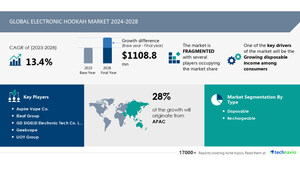NEW YORK, May 15, 2024 /PRNewswire/ -- The global sodium ion battery market size is estimated to grow by USD 414.4 mn from 2024-2028, according to Technavio. The market is estimated to grow at a CAGR of 17.33% during the forecast period.
For more insights on the forecast market size and historic data (2018 - 2022) - Download Free sample report in a minutes
Forecast period |
2024-2028 |
Base Year |
2023 |
Historic Data |
2018 - 2022 |
Segment Covered |
Application (Industrial, Commercial, and Residential), End-user (Stationary energy storge and Transportation), and Geography (APAC, Europe, North America, South America, and Middle East and Africa) |
Region Covered |
APAC, Europe, North America, South America, and Middle East and Africa |
Key companies profiled |
Altris AB, AMTE Power plc, Aquion Energy, Contemporary Amperex Technology Co. Ltd., Faradion Ltd, HiNa Battery Technology Co. Ltd., Natron Energy Inc., NEI Corp., NGK Insulators Ltd., and Tiamat |
Key Market Trends Fueling Growth
The sodium-ion battery market is experiencing significant growth due to the increasing demand for high-capacity and lightweight batteries in consumer applications, particularly in transportation, consumer electronics, and renewable energy sectors. Sodium-ions batteries offer advantages such as high energy density, nonflammability, and potential for lower production costs compared to lithium-ion batteries. These batteries can be sourced from the earth's crust and seawater, making sodium an abundant and eco-friendly alternative to lithium. The energy storage segment, including electric vehicles and energy efficiency applications, is expected to drive market growth during the forecast period. Additionally, sodium-ion batteries have potential applications in energy storage services, LED flashlights, and second-life applications. However, challenges such as supply disruptions and higher R&D costs remain.
Market Challenges
- Sodium-ion batteries, derived from abundant resources in the Earth's crust and seawater, offer cost advantages in the energy storage market. However, their shorter life cycles limit their suitability for long-term applications, such as grid energy storage and renewable energy integration. This challenge arises from the requirement for extended battery life in high-cycle industries like electric vehicles and industrial sectors. Despite the cost benefits, frequent battery replacements lead to higher long-term costs and reduced economic attractiveness. Sodium-ion batteries are currently used in niche applications, such as LED flashlights, but face competition from energy-dense lithium-ion batteries. The production cost of sodium-ion batteries and potential supply disruptions are other factors affecting their market penetration.
Research report provides comprehensive data on impact of trend, driver and challenges - Buy Report
Segment Overview
This sodium ion battery market report extensively covers market segmentation by
- Application
- 1.1 Industrial
- 1.2 Commercial
- 1.3 Residential
- End-user
- 2.1 Stationary energy storge
- 2.2 Transportation
- Geography
- 3.1 APAC
- 3.2 Europe
- 3.3 North America
- 3.4 South America
- 3.5 Middle East and Africa
1.1 Industrial- Sodium-ion batteries, an emerging alternative to lithium-ion batteries, are gaining traction in various industries, particularly in the Transportation sector for electric cars, and the Solar and Wind sectors for energy storage. These batteries offer energy efficiency and potentially lower manufacturing costs, making them a viable Lithium-ion battery substitute. Sodium, abundant in the Earth's crust and even in seawater, is the primary component of Sodium-ion batteries. The Energy storage segment, including electric vehicles and stationary energy storage, is expected to drive the market growth. Sodium-ion batteries can be employed in End use products such as LED flashlights and backup power systems for critical infrastructure, telecommunications, and remote areas. In the Electric car sector, they could contribute to energy density and energy storage services, addressing electricity demand and smart grid requirements. The market ecosystem includes Battery OEMs, raw material suppliers, and recycling companies. Production cost advantages, coupled with the batteries' nonflammability and ability to perform in colder temperatures, make Sodium-ion batteries an attractive option for energy storage applications. However, challenges such as supply disruptions and the need for battery recycling and second-life applications remain.
For more information on market segmentation with geographical analysis including forecast (2024-2028) and historic data (2018 - 2022) - Download a Sample Report
Research Analysis
The Sodium Ion Battery market represents an emerging trend in the energy storage segment, particularly for applications in transportation, such as electric vehicles. Sodium ion batteries offer several advantages over Lithium-ion batteries, including lower cost, greater abundance of sodium resources, and improved safety. These batteries have gained significant attention due to their potential to enhance the energy storage capabilities of renewable energy systems. The energy density of Sodium Ion Batteries may not match that of Lithium-ion batteries, but their environmental friendliness and cost-effectiveness make them a promising alternative. The market for Sodium Ion Batteries is expected to grow as research and development efforts continue to improve their performance and efficiency.
The Sodium Ion Battery market refers to the industry that produces and supplies sodium-ion batteries for various applications. These batteries offer several advantages over lithium-ion batteries, including a lower cost, higher energy density, and greater safety. The market for sodium-ion batteries is expected to grow significantly in the coming years due to the increasing demand for renewable energy storage solutions and the need for more sustainable and cost-effective energy storage technologies. The technology behind sodium-ion batteries is based on the use of sodium ions instead of lithium ions, which allows for the use of abundant and low-cost sodium resources. The market for sodium-ion batteries is also driven by the growing demand for electric vehicles and grid-scale energy storage systems. The market is expected to face challenges such as the need for further research and development to improve the performance and efficiency of sodium-ion batteries. The market is also expected to be influenced by regulatory policies and government initiatives aimed at promoting the adoption of renewable energy and sustainable energy storage solutions.
Table of Contents:
1 Executive Summary
2 Market Landscape
3 Market Sizing
4 Historic Market Size
5 Five Forces Analysis
6 Market Segmentation
- Application
- Industrial
- Commercial
- Residential
- End-user
- Stationary Energy Storge
- Transportation
- Geography
- APAC
- Europe
- North America
- South America
- Middle East And Africa
7 Customer Landscape
8 Geographic Landscape
9 Drivers, Challenges, and Trends
10 Company Landscape
11 Company Analysis
12 Appendix
About Technavio
Technavio is a leading global technology research and advisory company. Their research and analysis focuses on emerging market trends and provides actionable insights to help businesses identify market opportunities and develop effective strategies to optimize their market positions.
With over 500 specialized analysts, Technavio's report library consists of more than 17,000 reports and counting, covering 800 technologies, spanning across 50 countries. Their client base consists of enterprises of all sizes, including more than 100 Fortune 500 companies. This growing client base relies on Technavio's comprehensive coverage, extensive research, and actionable market insights to identify opportunities in existing and potential markets and assess their competitive positions within changing market scenarios.
Contacts
Technavio Research
Jesse Maida
Media & Marketing Executive
US: +1 844 364 1100
UK: +44 203 893 3200
Email: [email protected]
Website: www.technavio.com/
SOURCE Technavio

WANT YOUR COMPANY'S NEWS FEATURED ON PRNEWSWIRE.COM?
Newsrooms &
Influencers
Digital Media
Outlets
Journalists
Opted In





Share this article